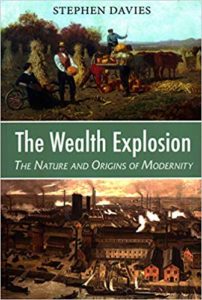In Stephen Davies’s The Wealth Explosion: The Nature and Origins of Modernity (2019) we have an extremely useful overview of one of the major historiographic debates of the past century: An examination into the various arguments about the causes of the spectacular economic growth of the capitalist economies of the modern era. But the book is far more than a review essay. It is also an engagement with these arguments that seeks to take their best insights and situate them within an explanation that is uniquely Davies’s own. To do justice to his endeavor, it is necessary to relate his argument to some of these more recent contributions.

Davies is presenting the case for a contingent confluence of both institutional and ideational factors. Thus while the wealth explosion may have had its beginning in the Western World as a matter of historical fact, it need not have occurred here at all, but for certain serendipitous events. Indeed, Davies argues, the great expansion almost began elsewhere. He is not alone in this line of argument, but his version represents a more refined kind of historical argumentation that requires closer scrutiny to be fully appreciated. The full implications of Davies’s work amounts to a direct and powerful challenge to a more recent development in the wealth debate: the state capacity arguments proffered by Noel Johnson, Mark Koyama and, more recently, Tyler Cowen.
Context: Ideas and/or Processes?
The historiography of modern economic development can be divided roughly along two broad trajectories. Those who look primarily to configurations of thought, whether of certain values or specific ideas (e.g. Max Weber, Joyce Appleby, Joel Mokyr and Deirdre McCloskey) or those who look principally to material, environmental or institutional processes (e.g. Carl Polanyi, Jared Diamond, Douglass North, E. L. Jones and Kenneth Pomeranz).
In each and every case, of course, we find a blending of both exogenous and endogenous factors simply because human beings are neither incorporeal spirits nor mindless reactive elements. There will always be relational, even dialectical, processes generated by the interaction of thought with social, political and material contexts. So the real question is, where to place the emphasis?
Davies’s particular blending begins with processes, essentially political and military ones much like those emphasized by North and Jones and heavily influenced by geography and the happenstance of plagues and conquests, much like those emphasized by Pomeranz and Diamond. However, Davies ends with ideas still holding the decisive place. Specifically, he singles out ideas about the importance of innovation and investment. In this, he shares the stage with a number of other writers like Appleby, Mokyr and McCloskey who have all stressed in one fashion or another the centrality of thought. But here is where a closer look at Davies reveals an interesting difference.
Both Appleby and Mokyr have stressed the priority in time of either scientific or technological know-how, facilitated by certain associational relations among the innovative classes. These ideas drove forward a revolutionary perspective on the perception of what was possible in a universe of mechanical forces (Appleby), and more directly, what was pragmatically achievable in their application to the tangible processes of production (Mokyr). The proximity in time and place of these very specific notions lend considerable weight to both arguments.
Yet, all of the associations and even the specific ideas of science and technology that Appleby and Mokyr focus on, were forming earlier than the late seventeenth and early eighteenth century when the great explosion in productivity began. Their role in the process was therefore one of a necessary proximate cause, but what motivated the earlier beginnings of this uptake of the ideas of science and technology?
McCloskey: The Value of Betterment
This is, of course, the key question that McCloskey chose to pursue. Another set of beliefs or opinions, she reasons, must have motivated action even earlier in time to prepare the cultural soil for the sudden increase in the productive application of technical know-how and scientific curiosity. And here, as I have argued elsewhere, is where McCloskey finds evidence for the gradual but steady extension of a very specific value: the value of personal betterment. One should carefully note that in all three authors–Appleby, Mokyr and McCloskey–processes, especially institutional ones, are not missing.
Scientific societies and technical associations are at the heart of the spread of useful ideas for both Mokyr (The Enlightened Economy) and Appleby (The Relentless Revolution). And for McCloskey (See esp. chapter 41 of Bourgeois Equality), the fact that in the West power happened to be so divided that no vast imperial power could squelch the desire for betterment assured the general reformation of culture in favor of the direction of improvement. It was this, she argued, that reoriented attention to those later ideas, making it possible to see the potential in both science and technology.
But these changes were not wrought by one specific set of ideas on its own. Rather it was a value or faith in the rightness of seeking one’s improvement, both materially and morally, as a general value that was the necessary fertilizer or cultural leaven. In other words, it was the acceptance of this very particular value of betterment not only for one’s self, but for others as well, that changed the culture from a zero-sum outlook to a win-win expectation.
Many streams of betterment, from spiritual to philosophical sources, fed this acceptance. Each stream can be seen as a fairly specific ideal type, and while McCloskey is quite critical of previous contributors to the debate, this should not be taken as a refutation, but rather a reordering of priorities. Thus Max Weber’s Protestant man is certainly one such tributary nourishing the belief in betterment. So is Mokyr’s craftsmen and so are Appleby’s scientists. You could add other–like Jones’ medieval merchants, or Harold Berman and Larry Siedentop’s Natural lawyers. Each is a specific channel that forms part of a larger river flooding a vast plain onto which the elements of a more general ideal of betterment are being stirred and deposited.
But the sufficient condition for McCloskey is just this one, very specific ingredient being carried along in each of the other streams. Each carries the idea of self-improvement in various forms that compound to form various nodal deposits around which everyone circulates. It is in this way that human perception is reoriented away from an earlier focus upon limits and constraints to one of potentialities and opportunities.
The force of McCloskey’s argument is powerful exactly because her story resonates with the modern individual’s sense of active choosing. It underscores the essence of hope, in all its sundry forms. Davies has done nothing to overturn that fundamental affirmation in McCloskey’s argument. But he has pointed to a still further and very important wrinkle in the argument.
Hans Eicholz is a historian and Liberty Fund Senior Fellow. He is the author of Harmonizing Sentiments: The Declaration of Independence and the Jeffersonian Idea of Self-Government (2001), and more recently a contributor to The Constitutionalism of American States (2008).


READER COMMENTS
Daniel Klein
Mar 27 2020 at 3:49am
Interesting.
I’m rather impressed with the argumentation in Siedentop’s book and, accordingly, inclined to doubt that liberalism could have happened outside of Christendom.
Hans Eicholz
Apr 6 2020 at 6:15pm
To be sure, Dan, it wouldn’t have been the same liberalism.
I take them to mean, Davies, McCloskey, etc, that it is quite thinkable that other places could have been as materially and even spiritually, creative and entrepreneurial as the West…and sustaining of such.
Wouldn’t anything else be too deterministic for historians?
Hans Eicholz
Apr 7 2020 at 10:02am
The point of Davies and McCloskey seems rather that it is conceivable that another matrix of ideas and practices could have come about elsewhere that might have been as conducive to creative flourishing, not that such a configuration would have had to have been a mirror of western Christendom. It raises lots of interesting questions respecting causality in history.
Comments are closed.